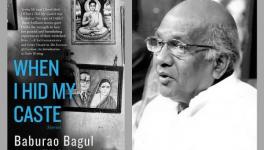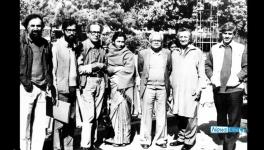Bittersweet: On Maharashtra’s Women With No Wombs
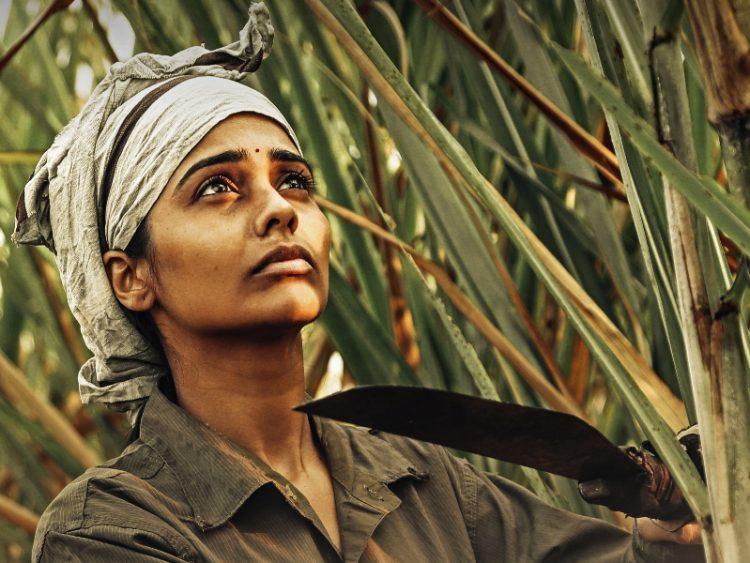
A scene from Bittersweet
Bittersweet is a strange title for a film, but filmmaker Ananth Mahadevan has combined the two words to mean something that reaches beyond its literal meaning. His new feature film in Marathi, explores through the eyes of young Suguna, the tragic lives of women of the menstruating age working in the sugar farms of Beed in Maharashtra. By now, the film has travelled to the Busan International Film Festival and also at the 26th Kolkata International Film Festival.
Explaining the title, Mahadevan says, “The story of the sugar that reaches you isn’t as sweet as the end product. The bitter experience of the women cane cutters is an irony that tugs at the social conscience. No man or woman is left untouched by this story of cane-cutters pushed to the wall for survival. Bittersweet is a dramatic but true account of a shocking ritual in the cash rich sugar industry of Maharashtra, that could be emotionally draining and biologically devastating! Bittersweet tells the true story of Satya Bhama, the woman who condemned the ritual of having to remove her womb and compared it to the dark slave ages of America. The perpetrators and the victims do not realise that they are toying with the balance of nature and maybe wiping out an entire future civilization.”
Explaining how he chanced upon this explosive story, he says, “The first-person account of a cane cutter Satyabhama that narrated her ordeal along with other women led the media to a headline Beed: The Village of Women Without Wombs. It aroused interest and I dug deep into secrets camouflaged amidst the glory of India being the second largest exporter of sugar in the world. I discovered the details in September 2019 and set about to write a screenplay, because this was a subject crying to be visualised on screen. The report states that there are 10 lakh sugarcane cutters in Maharashtra, half of them from Beed. Figures from civil rights associations allege that the hysterectomy rate in Beed is 14% more than the rest of the state.”
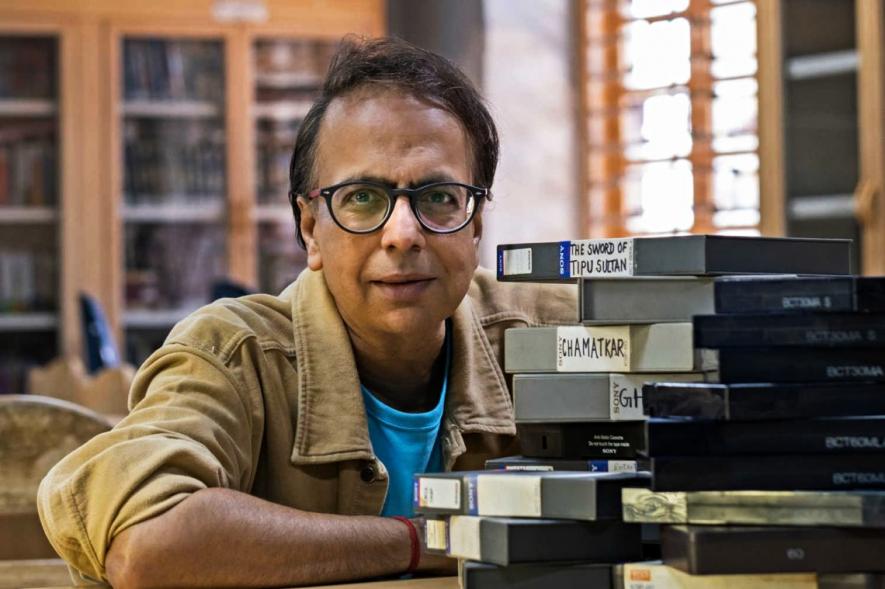
Ananth Mahadevan | Cinestaan
Mahadevan’s research for the film has revealed that lakhs of cane cutters migrate to western Maharashtra from October to March — the season cane cutting in the sugar belt. As the drought in the region intensifies, the migration doubles. Contractors here have a problem with the menstrual cycle of the women, as it hinders the course of their work.
Naturally, women on their period would often ask for leave for a day or two. This is unacceptable for contractors during the peak season and are fined for it, instead of granting them leave. Contracts in the farms are drawn up with the husband and wife counted as a single unit, therefore affecting the entire family. To escape such threatening consequences, women in Beed find it better to remove their uteruses. There are 99 private hospitals in the Beed district and 11 of these have carried out more than 100 hysterectomies in the last three years. Around 4605 women have had their uterus removed in Maharashtra and the rate in Beed is 14 times more than that for the state or country.
22-year-old Suguna is just a speck among the many sugarcane cutters transported to Beed every year during the peak season of six months starting in October. She is forced to work without pay due to her ill father’s inability to pay back his debt of thousands of rupees from the previous year. Though inexperienced in cutting sugarcane, Suguna is determined to increase her output each day, in order to earn enough to compensate for her father’s labour who has aged beyond his years.
It’s during one of these days that Suguna discovers the harsh truth. Absent for three days because of severe menstrual cramps, she learns that she has lost a sizable amount of salary and has to further compensate the sugar contractor by paying a hefty fine. She then battles the dilemma of either losing her womb forever or to resign to a life of poverty and debts.
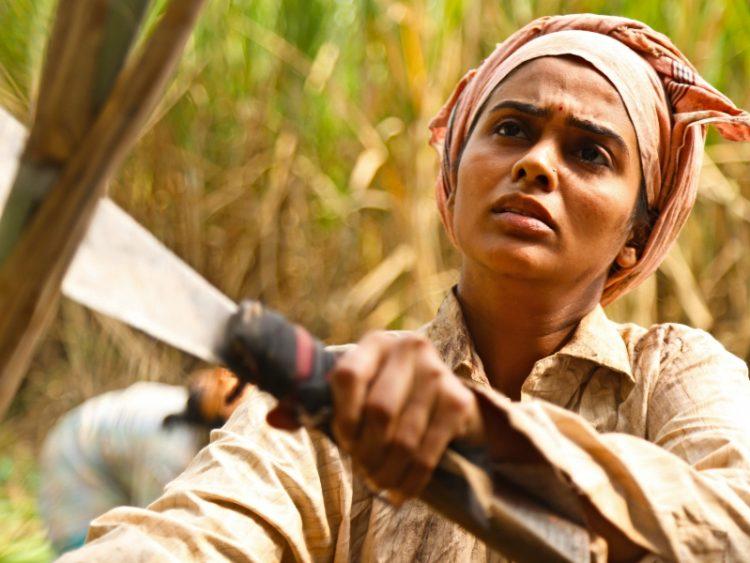
Akshaya Gurav in a scene from Bittersweet
Suguna looks to social activist Goyal for advice and though he asks her to protest against the inhumane norm, the contractor offers to pay her an advance to conduct the medical operation. The cost of hysterectomy is therefore borne by the contractor, who has an arrangement with a gynaecologist and nursing home. The deal however, is that once the operation has been carried out, the woman must pay back the money in instalments. Forced to surrender in the end, she decides to never become a mother in her life — not realising that the right to her body, her choice to conceive, carry and produce a child is being illegally and unethically snatched from her forever.
Although largely in documentary format, the work effectively blends fiction in the unfolding of Suguna’s struggle to reserve the right to her womb. However, the performance of the entire cast is so organic and candid that one feels that they are really the characters they are portraying. Mahadevan says that he found it extremely difficult to find a producer for his off-beat film but finally, “My producers, Suchhanda Chatterjee and Shubha Shetty, connected with me. The subject moved them and they raised the finance in three days. Their company, ‘Quest Films’, believes in path breaking cinema and Bittersweet became their first production. Their faith in the content and me energised me to make sure that the film spoke an unrelenting global cinema language.”
A thorough Mumbaikar, actor, director and writer far removed from Beed, I wondered what pushed Mahadevan to make this film. He responded, “As a director I am never far removed from core reality. My previous films, Mee Sindhutai Sapkal, Gour Hari Dastaan, Rough Book and Mai Ghat were all rooted in human stories that held an universal appeal. I believe I should be a socially responsible storyteller. The relevance of Bittersweet cannot be undermined. Despite living in the formula infested web that calls itself Bollywood, I have steered clear of the beaten path in my previous seven outings. Bittersweet in a way is a culmination of my efforts to chart a totally unpredictable course of cinema.”
Marathi model and actress Akshaya Gurav, who makes her debut in the film, lives the role as if she has experienced everything herself. The same goes for Anil Nagarwar as Vikas Rane the contractor, Guru Thakur as Dr. Piyush Jha the gynaecologist, Smita Tambe as Suguna’s mother and Vinayak Devekar, as her ageing and ailing father. The music is minimalist and the editing is good, as the camera moves through villages like Majalgaon in Beed district panning across unending sugarcane fields and sprawling sugarcane mills provide the perfect backdrop. “It was like a god-sent production design,” says Mahadevan.
The filmmaker explains the reason for this gruesome exploitation of the marginalised, especially women as thus: “In its bid to outdo Brazil as the numero uno exporter of sugar in the world, sugar barons end up surreptitiously exploiting women labour in the fields. By enticing them to undergo hysterectomy, the system, besides inflicting mental stress on the cutters, also defies all natural biological progression of the human race. The people at the helm are so powerful that nothing can be pinned on them for perpetrating this horrific deed. And that is the frightening part. Suguna dared to spill the beans. This is her true story, that however was quelled and pushed under the carpet. Bittersweet is a story of survival….killing one’s present to protect their future!”
Shoma A Chatterji is a National Award winning author, freelance journalist, and a film scholar, based in Kolkata, India.
Courtesy: Indian Cultural Forum
Get the latest reports & analysis with people's perspective on Protests, movements & deep analytical videos, discussions of the current affairs in your Telegram app. Subscribe to NewsClick's Telegram channel & get Real-Time updates on stories, as they get published on our website.














